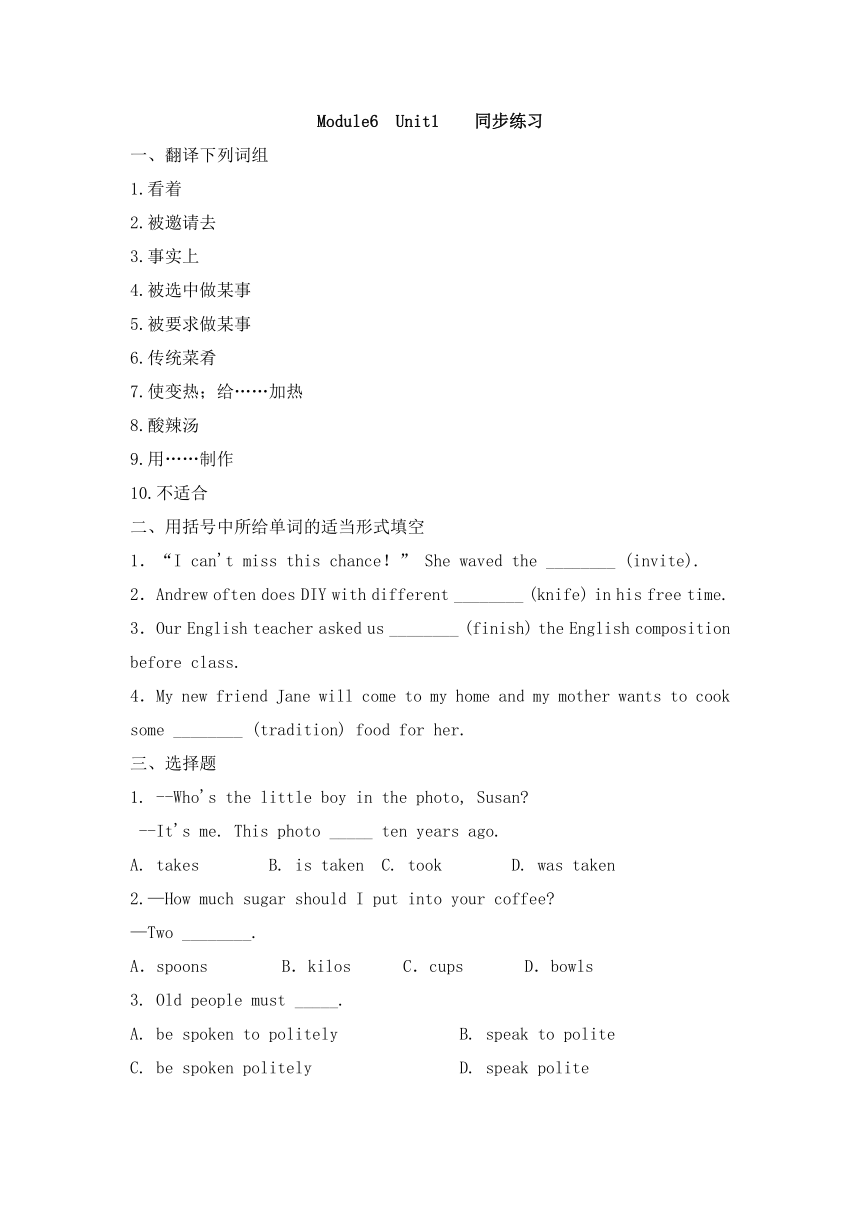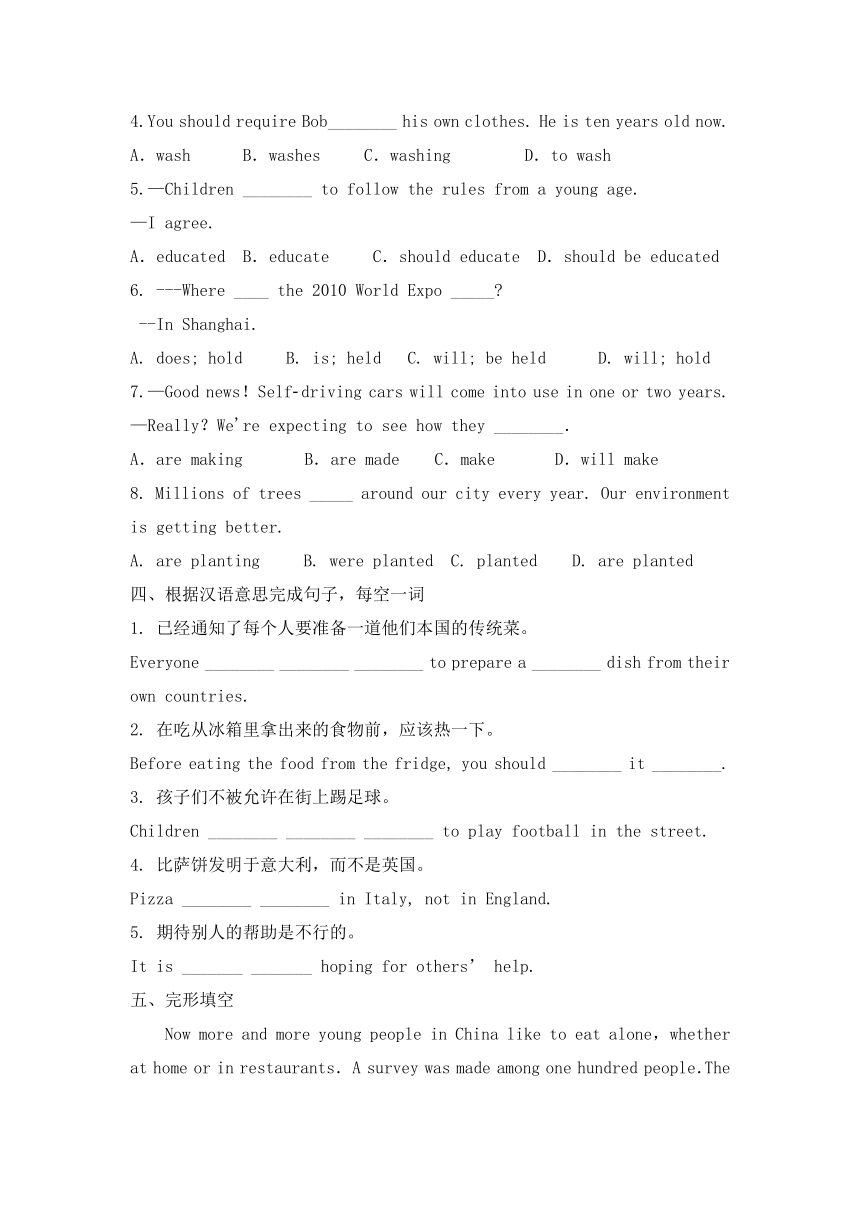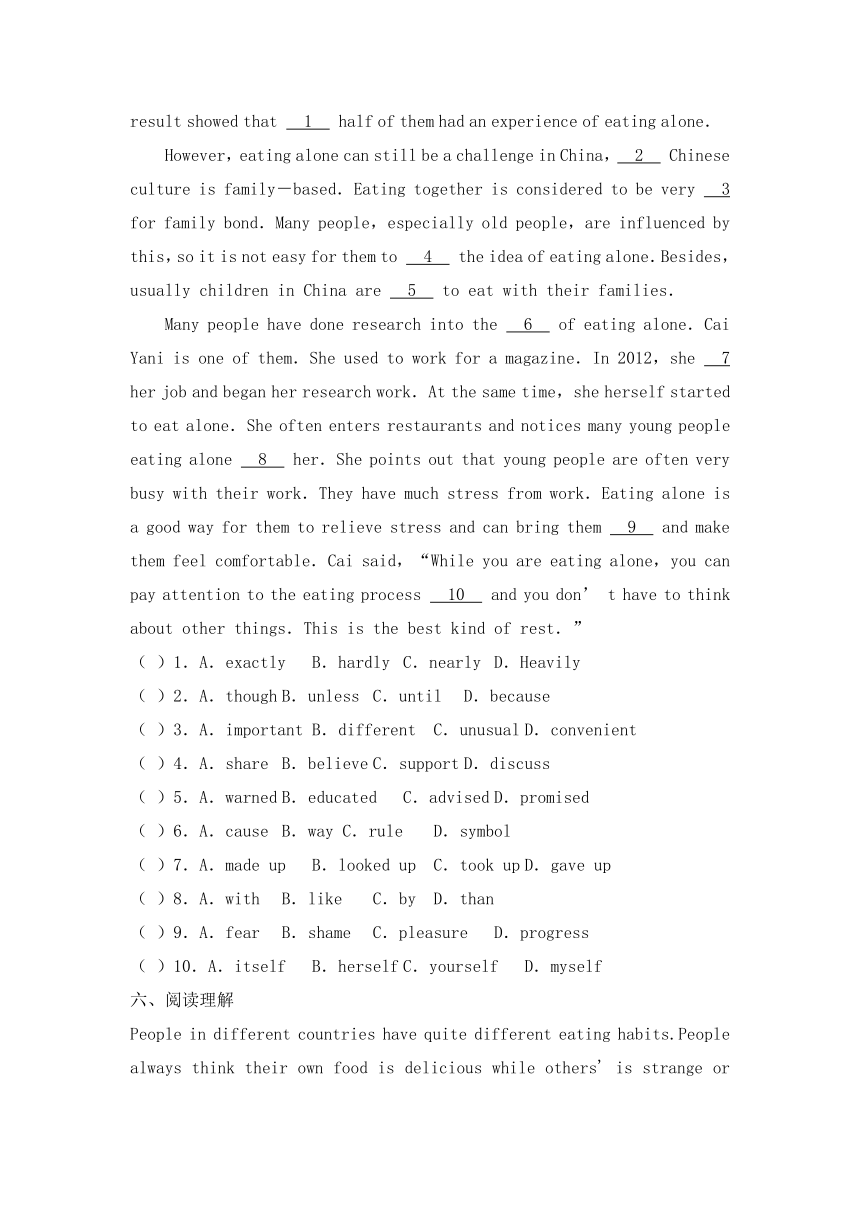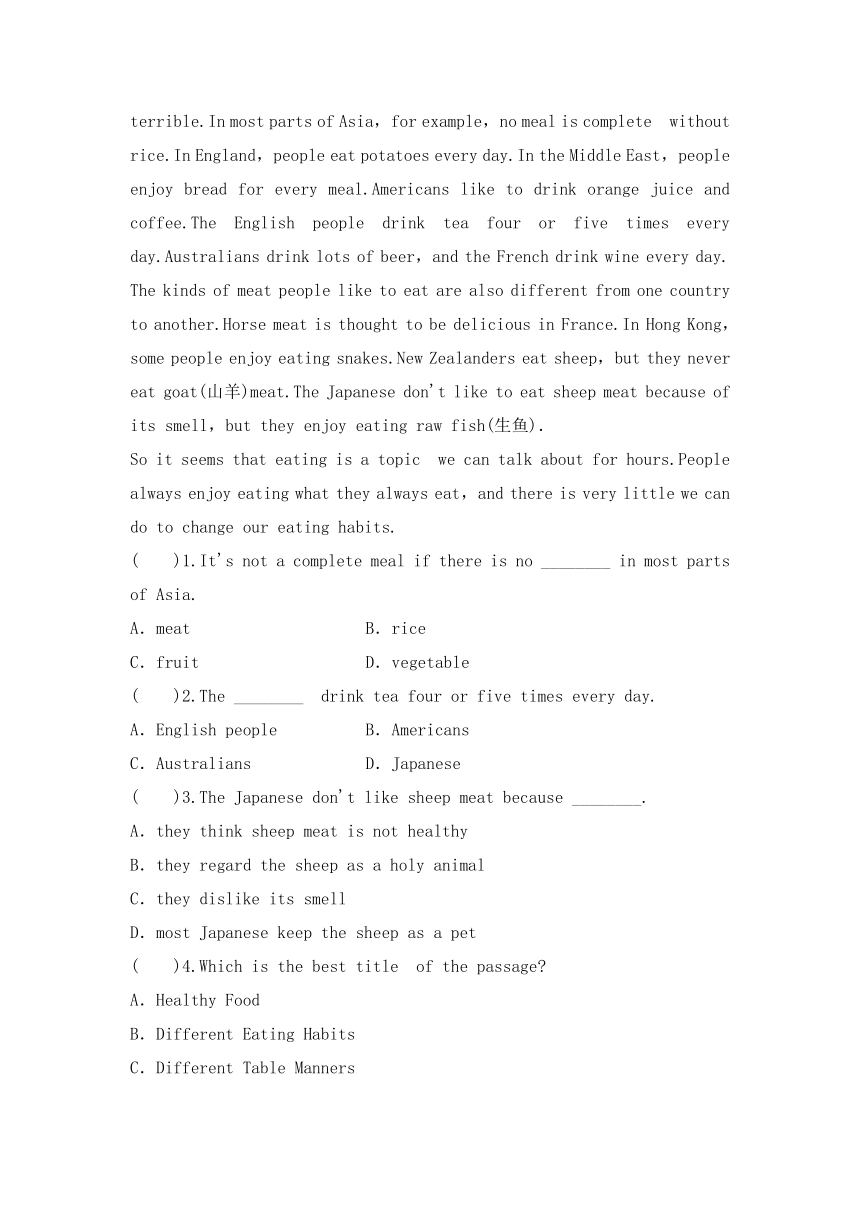Module 6 Unit 1 When is the school-leavers' party? 同步练习 (含解析) 2024-2025学年外研版九年级英语下册
文档属性
| 名称 | Module 6 Unit 1 When is the school-leavers' party? 同步练习 (含解析) 2024-2025学年外研版九年级英语下册 |  | |
| 格式 | docx | ||
| 文件大小 | 27.9KB | ||
| 资源类型 | 教案 | ||
| 版本资源 | 外研版 | ||
| 科目 | 英语 | ||
| 更新时间 | 2025-03-17 14:29:17 | ||
图片预览





文档简介
Module6 Unit1 同步练习
翻译下列词组
1.看着
2.被邀请去
3.事实上
4.被选中做某事
5.被要求做某事
6.传统菜肴
7.使变热;给……加热
8.酸辣汤
9.用……制作
10.不适合
二、用括号中所给单词的适当形式填空
1.“I can't miss this chance!” She waved the ________ (invite).
2.Andrew often does DIY with different ________ (knife) in his free time.
3.Our English teacher asked us ________ (finish) the English composition before class.
4.My new friend Jane will come to my home and my mother wants to cook some ________ (tradition) food for her.
三、选择题
1. --Who's the little boy in the photo, Susan
--It's me. This photo _____ ten years ago.
A. takes B. is taken C. took D. was taken
2.—How much sugar should I put into your coffee
—Two ________.
A.spoons B.kilos C.cups D.bowls
3. Old people must _____.
A. be spoken to politely B. speak to polite
C. be spoken politely D. speak polite
4.You should require Bob________ his own clothes. He is ten years old now.
A.wash B.washes C.washing D.to wash
5.—Children ________ to follow the rules from a young age.
—I agree.
A.educated B.educate C.should educate D.should be educated
6. ---Where ____ the 2010 World Expo _____
--In Shanghai.
A. does; hold B. is; held C. will; be held D. will; hold
7.—Good news!Self driving cars will come into use in one or two years.
—Really?We're expecting to see how they ________.
A.are making B.are made C.make D.will make
8. Millions of trees _____ around our city every year. Our environment is getting better.
A. are planting B. were planted C. planted D. are planted
四、根据汉语意思完成句子,每空一词
1. 已经通知了每个人要准备一道他们本国的传统菜。
Everyone ________ ________ ________ to prepare a ________ dish from their own countries.
2. 在吃从冰箱里拿出来的食物前,应该热一下。
Before eating the food from the fridge, you should ________ it ________.
3. 孩子们不被允许在街上踢足球。
Children ________ ________ ________ to play football in the street.
4. 比萨饼发明于意大利,而不是英国。
Pizza ________ ________ in Italy, not in England.
5. 期待别人的帮助是不行的。
It is _______ _______ hoping for others’ help.
五、完形填空
Now more and more young people in China like to eat alone,whether at home or in restaurants.A survey was made among one hundred people.The result showed that 1 half of them had an experience of eating alone.
However,eating alone can still be a challenge in China, 2 Chinese culture is family-based.Eating together is considered to be very 3 for family bond.Many people,especially old people,are influenced by this,so it is not easy for them to 4 the idea of eating alone.Besides,usually children in China are 5 to eat with their families.
Many people have done research into the 6 of eating alone.Cai Yani is one of them.She used to work for a magazine.In 2012,she 7 her job and began her research work.At the same time,she herself started to eat alone.She often enters restaurants and notices many young people eating alone 8 her.She points out that young people are often very busy with their work.They have much stress from work.Eating alone is a good way for them to relieve stress and can bring them 9 and make them feel comfortable.Cai said,“While you are eating alone,you can pay attention to the eating process 10 and you don’ t have to think about other things.This is the best kind of rest.”
( )1.A.exactly B.hardly C.nearly D.Heavily
( )2.A.though B.unless C.until D.because
( )3.A.important B.different C.unusual D.convenient
( )4.A.share B.believe C.support D.discuss
( )5.A.warned B.educated C.advised D.promised
( )6.A.cause B.way C.rule D.symbol
( )7.A.made up B.looked up C.took up D.gave up
( )8.A.with B.like C.by D.than
( )9.A.fear B.shame C.pleasure D.progress
( )10.A.itself B.herself C.yourself D.myself
六、阅读理解
People in different countries have quite different eating habits.People always think their own food is delicious while others' is strange or terrible.In most parts of Asia,for example,no meal is complete without rice.In England,people eat potatoes every day.In the Middle East,people enjoy bread for every meal.Americans like to drink orange juice and coffee.The English people drink tea four or five times every day.Australians drink lots of beer,and the French drink wine every day.
The kinds of meat people like to eat are also different from one country to another.Horse meat is thought to be delicious in France.In Hong Kong,some people enjoy eating snakes.New Zealanders eat sheep,but they never eat goat(山羊)meat.The Japanese don't like to eat sheep meat because of its smell,but they enjoy eating raw fish(生鱼).
So it seems that eating is a topic we can talk about for hours.People always enjoy eating what they always eat,and there is very little we can do to change our eating habits.
( )1.It's not a complete meal if there is no ________ in most parts of Asia.
A.meat B.rice
C.fruit D.vegetable
( )2.The ________ drink tea four or five times every day.
A.English people B.Americans
C.Australians D.Japanese
( )3.The Japanese don't like sheep meat because ________.
A.they think sheep meat is not healthy
B.they regard the sheep as a holy animal
C.they dislike its smell
D.most Japanese keep the sheep as a pet
( )4.Which is the best title of the passage
A.Healthy Food
B.Different Eating Habits
C.Different Table Manners
D.How to Cook Food
一、翻译下列词组
看着:look at…,表示注视、查看某个事物。
被邀请去:be invited to,用于表达某人被邀请去做某事或去某个地方。
事实上:in fact,常用来引出与之前所说内容相关的实际情况或强调真实情况。
被选中做某事:be chosen to do sth.,体现某人经过挑选被赋予做某事的机会。
被要求做某事:be asked to do sth.,表明某人受到他人要求去执行某项任务。
传统菜肴:traditional dish,指具有特定地域或文化传统特色的菜品。
使变热;给…… 加热:heat up,可用于表示使食物、物体等升温变热。
酸辣汤:hot and sour soup,一种具有酸辣口味特点的汤品。
用…… 制作:be made with,强调制作过程中使用了某些材料或成分。
不适合:no good,可用于表达某物或某事不合适、没有用处等含义。
二、用括号中所给单词的适当形式填空
invitation:“invite” 是动词,意为 “邀请”,这里需要名词形式 “invitation”,表示 “邀请函”,句意为 “她挥舞着邀请函说‘我不能错过这个机会!’”,故填 “invitation”。
knives:“knife” 是可数名词,意为 “刀”,“different” 后接可数名词复数,“knife” 的复数形式是 “knives”,句意为 “安德鲁在空闲时间经常用不同的刀做手工”,故填 “knives”。
to finish:“ask sb. to do sth.” 是固定搭配,意为 “要求某人做某事”,句意为 “我们英语老师要求我们在课前完成英语作文”,故填 “to finish”。
traditional:“tradition” 是名词,意为 “传统”,这里需要形容词 “traditional” 修饰名词 “food”,表示 “传统的食物”,句意为 “我的新朋友简要来我家,我妈妈想为她做一些传统食物”,故填 “traditional”。
三、选择题
D:“photo” 与 “take” 之间是被动关系,要用被动语态 “be + 过去分词”,根据 “ten years ago” 可知用一般过去时,主语 “this photo” 是第三人称单数,be 动词用 “was”,“take” 的过去分词是 “taken”,所以选 D,句意为 “—— 苏珊,照片里的小男孩是谁?—— 是我。这张照片是十年前拍的”。
A:根据 “How much sugar” 可知问的是放多少糖,“spoon” 意为 “勺子”,“two spoons” 表示 “两勺”,符合语境,“kilo” 意为 “千克”,“cup” 意为 “杯子”,“bowl” 意为 “碗”,均不符合问放多少糖的语境,所以选 A,句意为 “—— 我应该在你的咖啡里放多少糖?—— 两勺”。
A:“Old people” 与 “speak to” 之间是被动关系,要用被动语态 “be + 过去分词”,“speak to sb. politely” 表示 “礼貌地和某人说话”,所以选 A,句意为 “必须礼貌地和老人说话”。
D:“require sb. to do sth.” 是固定搭配,意为 “要求某人做某事”,所以选 D,句意为 “你应该要求鲍勃洗他自己的衣服。他现在十岁了”。
D:“Children” 与 “educate” 之间是被动关系,要用被动语态 “be + 过去分词”,“should be educated” 表示 “应该被教育”,所以选 D,句意为 “孩子们从小就应该被教育遵守规则。—— 我同意”。
C:“the 2010 World Expo” 与 “hold” 之间是被动关系,要用被动语态 “be + 过去分词”,“hold” 的过去分词是 “held”,根据语境可知问的是 2010 年世博会将在哪里举办,用一般将来时的被动语态 “will + be + 过去分词”,所以选 C,句意为 “——2010 年世博会将在哪里举办?—— 在上海”。
B:“they” 指代 “Self - driving cars”,与 “make” 之间是被动关系,要用被动语态 “be + 过去分词”,所以选 B,句意为 “—— 好消息!自动驾驶汽车将在一两年内投入使用。—— 真的吗?我们期待看到它们是如何被制造出来的”。
D:“trees” 与 “plant” 之间是被动关系,要用被动语态 “be + 过去分词”,根据 “every year” 可知用一般现在时,主语 “Millions of trees” 是复数,be 动词用 “are”,“plant” 的过去分词是 “planted”,所以选 D,句意为 “每年我们城市周围都会种植数百万棵树。我们的环境正在变得更好”。
四、根据汉语意思完成句子,每空一词
has been told; traditional:“已经通知了” 用现在完成时的被动语态 “have/has been + 过去分词”,主语 “Everyone” 是第三人称单数,助动词用 “has”,“tell” 的过去分词是 “told”;“传统的” 是 “traditional”,故填 “has been told; traditional”。
heat; up:“heat up” 表示 “加热”,“should” 后接动词原形,故填 “heat; up”。
are not allowed:“被允许做某事” 是 “be allowed to do sth.”,其否定形式是 “be not allowed to do sth.”,主语 “Children” 是复数,be 动词用 “are”,故填 “are not allowed”。
was invented:“发明” 是 “invent”,“Pizza” 与 “invent” 之间是被动关系,用被动语态 “be + 过去分词”,根据语境用一般过去时,主语 “Pizza” 是第三人称单数,be 动词用 “was”,“invent” 的过去分词是 “invented”,故填 “was invented”。
no good:“no good” 表示 “不适合;没用”,符合句意,故填 “no good”。
五、完形填空
C:“nearly” 意为 “几乎,差不多”,“nearly half of them” 表示 “他们中几乎一半的人”,符合语境,“exactly” 意为 “确切地”,“hardly” 意为 “几乎不”,“heavily” 意为 “沉重地”,均不符合,所以选 C。
D:前后句是因果关系,“because” 表示 “因为”,解释在中国独自吃饭是挑战的原因是中国文化以家庭为基础,“though” 表示 “虽然”,“unless” 表示 “除非”,“until” 表示 “直到”,均不符合,所以选 D。
A:“important” 意为 “重要的”,根据 “Chinese culture is family - based” 可知一起吃饭对家庭纽带很重要,“different” 意为 “不同的”,“unusual” 意为 “不寻常的”,“convenient” 意为 “方便的”,均不符合,所以选 A。
C:“support” 意为 “支持”,这里指老人不容易支持独自吃饭的想法,“share” 意为 “分享”,“believe” 意为 “相信”,“discuss” 意为 “讨论”,均不符合,所以选 C。
B:“educate” 意为 “教育”,“be educated to do sth.” 表示 “被教育去做某事”,这里指中国的孩子通常被教育要和家人一起吃饭,“warn” 意为 “警告”,“advise” 意为 “建议”,“promise” 意为 “承诺”,均不符合,所以选 B。
A:“cause” 意为 “原因,起因”,这里指很多人研究独自吃饭的原因,“way” 意为 “方式”,“rule” 意为 “规则”,“symbol” 意为 “象征”,均不符合,所以选 A。
D:“give up” 意为 “放弃”,根据 “began her research work” 可知她放弃了工作开始研究,“make up” 意为 “组成;编造”,“look up” 意为 “查阅”,“take up” 意为 “占据;开始从事”,均不符合,所以选 D。
B:“like” 意为 “像”,这里指她注意到很多年轻人像她一样独自吃饭,“with” 意为 “和…… 一起”,“by” 意为 “通过;在…… 旁边”,“than” 意为 “比”,均不符合,所以选 B。
C:“pleasure” 意为 “快乐”,根据 “make them feel comfortable” 可知独自吃饭能给他们带来快乐,“fear” 意为 “恐惧”,“shame” 意为 “羞愧”,“progress” 意为 “进步”,均不符合,所以选 C。
A:这里指吃饭过程本身,用 “itself”,句意为 “当你独自吃饭时,你可以专注于吃饭过程本身,不必考虑其他事情”,所以选 A。
六、阅读理解
B:根据 “In most parts of Asia,for example,no meal is complete without rice.” 可知在亚洲大部分地区,没有米饭就不算一顿完整的饭,所以选 B。
A:根据 “The English people drink tea four or five times every day.” 可知英国人每天喝四五次茶,所以选 A。
C:根据 “The Japanese don't like to eat sheep meat because of its smell” 可知日本人不喜欢吃羊肉是因为它的味道,所以选 C。
B:文章主要讲述了不同国家人们不同的饮食习惯,“Different Eating Habits”(不同的饮食习惯)作为标题最合适,“Healthy Food”(健康食物)、“Different Table Manners”(不同的餐桌礼仪)、“How to Cook Food”(如何烹饪食物)均不能全面概括文章内容,所以选 B。
翻译下列词组
1.看着
2.被邀请去
3.事实上
4.被选中做某事
5.被要求做某事
6.传统菜肴
7.使变热;给……加热
8.酸辣汤
9.用……制作
10.不适合
二、用括号中所给单词的适当形式填空
1.“I can't miss this chance!” She waved the ________ (invite).
2.Andrew often does DIY with different ________ (knife) in his free time.
3.Our English teacher asked us ________ (finish) the English composition before class.
4.My new friend Jane will come to my home and my mother wants to cook some ________ (tradition) food for her.
三、选择题
1. --Who's the little boy in the photo, Susan
--It's me. This photo _____ ten years ago.
A. takes B. is taken C. took D. was taken
2.—How much sugar should I put into your coffee
—Two ________.
A.spoons B.kilos C.cups D.bowls
3. Old people must _____.
A. be spoken to politely B. speak to polite
C. be spoken politely D. speak polite
4.You should require Bob________ his own clothes. He is ten years old now.
A.wash B.washes C.washing D.to wash
5.—Children ________ to follow the rules from a young age.
—I agree.
A.educated B.educate C.should educate D.should be educated
6. ---Where ____ the 2010 World Expo _____
--In Shanghai.
A. does; hold B. is; held C. will; be held D. will; hold
7.—Good news!Self driving cars will come into use in one or two years.
—Really?We're expecting to see how they ________.
A.are making B.are made C.make D.will make
8. Millions of trees _____ around our city every year. Our environment is getting better.
A. are planting B. were planted C. planted D. are planted
四、根据汉语意思完成句子,每空一词
1. 已经通知了每个人要准备一道他们本国的传统菜。
Everyone ________ ________ ________ to prepare a ________ dish from their own countries.
2. 在吃从冰箱里拿出来的食物前,应该热一下。
Before eating the food from the fridge, you should ________ it ________.
3. 孩子们不被允许在街上踢足球。
Children ________ ________ ________ to play football in the street.
4. 比萨饼发明于意大利,而不是英国。
Pizza ________ ________ in Italy, not in England.
5. 期待别人的帮助是不行的。
It is _______ _______ hoping for others’ help.
五、完形填空
Now more and more young people in China like to eat alone,whether at home or in restaurants.A survey was made among one hundred people.The result showed that 1 half of them had an experience of eating alone.
However,eating alone can still be a challenge in China, 2 Chinese culture is family-based.Eating together is considered to be very 3 for family bond.Many people,especially old people,are influenced by this,so it is not easy for them to 4 the idea of eating alone.Besides,usually children in China are 5 to eat with their families.
Many people have done research into the 6 of eating alone.Cai Yani is one of them.She used to work for a magazine.In 2012,she 7 her job and began her research work.At the same time,she herself started to eat alone.She often enters restaurants and notices many young people eating alone 8 her.She points out that young people are often very busy with their work.They have much stress from work.Eating alone is a good way for them to relieve stress and can bring them 9 and make them feel comfortable.Cai said,“While you are eating alone,you can pay attention to the eating process 10 and you don’ t have to think about other things.This is the best kind of rest.”
( )1.A.exactly B.hardly C.nearly D.Heavily
( )2.A.though B.unless C.until D.because
( )3.A.important B.different C.unusual D.convenient
( )4.A.share B.believe C.support D.discuss
( )5.A.warned B.educated C.advised D.promised
( )6.A.cause B.way C.rule D.symbol
( )7.A.made up B.looked up C.took up D.gave up
( )8.A.with B.like C.by D.than
( )9.A.fear B.shame C.pleasure D.progress
( )10.A.itself B.herself C.yourself D.myself
六、阅读理解
People in different countries have quite different eating habits.People always think their own food is delicious while others' is strange or terrible.In most parts of Asia,for example,no meal is complete without rice.In England,people eat potatoes every day.In the Middle East,people enjoy bread for every meal.Americans like to drink orange juice and coffee.The English people drink tea four or five times every day.Australians drink lots of beer,and the French drink wine every day.
The kinds of meat people like to eat are also different from one country to another.Horse meat is thought to be delicious in France.In Hong Kong,some people enjoy eating snakes.New Zealanders eat sheep,but they never eat goat(山羊)meat.The Japanese don't like to eat sheep meat because of its smell,but they enjoy eating raw fish(生鱼).
So it seems that eating is a topic we can talk about for hours.People always enjoy eating what they always eat,and there is very little we can do to change our eating habits.
( )1.It's not a complete meal if there is no ________ in most parts of Asia.
A.meat B.rice
C.fruit D.vegetable
( )2.The ________ drink tea four or five times every day.
A.English people B.Americans
C.Australians D.Japanese
( )3.The Japanese don't like sheep meat because ________.
A.they think sheep meat is not healthy
B.they regard the sheep as a holy animal
C.they dislike its smell
D.most Japanese keep the sheep as a pet
( )4.Which is the best title of the passage
A.Healthy Food
B.Different Eating Habits
C.Different Table Manners
D.How to Cook Food
一、翻译下列词组
看着:look at…,表示注视、查看某个事物。
被邀请去:be invited to,用于表达某人被邀请去做某事或去某个地方。
事实上:in fact,常用来引出与之前所说内容相关的实际情况或强调真实情况。
被选中做某事:be chosen to do sth.,体现某人经过挑选被赋予做某事的机会。
被要求做某事:be asked to do sth.,表明某人受到他人要求去执行某项任务。
传统菜肴:traditional dish,指具有特定地域或文化传统特色的菜品。
使变热;给…… 加热:heat up,可用于表示使食物、物体等升温变热。
酸辣汤:hot and sour soup,一种具有酸辣口味特点的汤品。
用…… 制作:be made with,强调制作过程中使用了某些材料或成分。
不适合:no good,可用于表达某物或某事不合适、没有用处等含义。
二、用括号中所给单词的适当形式填空
invitation:“invite” 是动词,意为 “邀请”,这里需要名词形式 “invitation”,表示 “邀请函”,句意为 “她挥舞着邀请函说‘我不能错过这个机会!’”,故填 “invitation”。
knives:“knife” 是可数名词,意为 “刀”,“different” 后接可数名词复数,“knife” 的复数形式是 “knives”,句意为 “安德鲁在空闲时间经常用不同的刀做手工”,故填 “knives”。
to finish:“ask sb. to do sth.” 是固定搭配,意为 “要求某人做某事”,句意为 “我们英语老师要求我们在课前完成英语作文”,故填 “to finish”。
traditional:“tradition” 是名词,意为 “传统”,这里需要形容词 “traditional” 修饰名词 “food”,表示 “传统的食物”,句意为 “我的新朋友简要来我家,我妈妈想为她做一些传统食物”,故填 “traditional”。
三、选择题
D:“photo” 与 “take” 之间是被动关系,要用被动语态 “be + 过去分词”,根据 “ten years ago” 可知用一般过去时,主语 “this photo” 是第三人称单数,be 动词用 “was”,“take” 的过去分词是 “taken”,所以选 D,句意为 “—— 苏珊,照片里的小男孩是谁?—— 是我。这张照片是十年前拍的”。
A:根据 “How much sugar” 可知问的是放多少糖,“spoon” 意为 “勺子”,“two spoons” 表示 “两勺”,符合语境,“kilo” 意为 “千克”,“cup” 意为 “杯子”,“bowl” 意为 “碗”,均不符合问放多少糖的语境,所以选 A,句意为 “—— 我应该在你的咖啡里放多少糖?—— 两勺”。
A:“Old people” 与 “speak to” 之间是被动关系,要用被动语态 “be + 过去分词”,“speak to sb. politely” 表示 “礼貌地和某人说话”,所以选 A,句意为 “必须礼貌地和老人说话”。
D:“require sb. to do sth.” 是固定搭配,意为 “要求某人做某事”,所以选 D,句意为 “你应该要求鲍勃洗他自己的衣服。他现在十岁了”。
D:“Children” 与 “educate” 之间是被动关系,要用被动语态 “be + 过去分词”,“should be educated” 表示 “应该被教育”,所以选 D,句意为 “孩子们从小就应该被教育遵守规则。—— 我同意”。
C:“the 2010 World Expo” 与 “hold” 之间是被动关系,要用被动语态 “be + 过去分词”,“hold” 的过去分词是 “held”,根据语境可知问的是 2010 年世博会将在哪里举办,用一般将来时的被动语态 “will + be + 过去分词”,所以选 C,句意为 “——2010 年世博会将在哪里举办?—— 在上海”。
B:“they” 指代 “Self - driving cars”,与 “make” 之间是被动关系,要用被动语态 “be + 过去分词”,所以选 B,句意为 “—— 好消息!自动驾驶汽车将在一两年内投入使用。—— 真的吗?我们期待看到它们是如何被制造出来的”。
D:“trees” 与 “plant” 之间是被动关系,要用被动语态 “be + 过去分词”,根据 “every year” 可知用一般现在时,主语 “Millions of trees” 是复数,be 动词用 “are”,“plant” 的过去分词是 “planted”,所以选 D,句意为 “每年我们城市周围都会种植数百万棵树。我们的环境正在变得更好”。
四、根据汉语意思完成句子,每空一词
has been told; traditional:“已经通知了” 用现在完成时的被动语态 “have/has been + 过去分词”,主语 “Everyone” 是第三人称单数,助动词用 “has”,“tell” 的过去分词是 “told”;“传统的” 是 “traditional”,故填 “has been told; traditional”。
heat; up:“heat up” 表示 “加热”,“should” 后接动词原形,故填 “heat; up”。
are not allowed:“被允许做某事” 是 “be allowed to do sth.”,其否定形式是 “be not allowed to do sth.”,主语 “Children” 是复数,be 动词用 “are”,故填 “are not allowed”。
was invented:“发明” 是 “invent”,“Pizza” 与 “invent” 之间是被动关系,用被动语态 “be + 过去分词”,根据语境用一般过去时,主语 “Pizza” 是第三人称单数,be 动词用 “was”,“invent” 的过去分词是 “invented”,故填 “was invented”。
no good:“no good” 表示 “不适合;没用”,符合句意,故填 “no good”。
五、完形填空
C:“nearly” 意为 “几乎,差不多”,“nearly half of them” 表示 “他们中几乎一半的人”,符合语境,“exactly” 意为 “确切地”,“hardly” 意为 “几乎不”,“heavily” 意为 “沉重地”,均不符合,所以选 C。
D:前后句是因果关系,“because” 表示 “因为”,解释在中国独自吃饭是挑战的原因是中国文化以家庭为基础,“though” 表示 “虽然”,“unless” 表示 “除非”,“until” 表示 “直到”,均不符合,所以选 D。
A:“important” 意为 “重要的”,根据 “Chinese culture is family - based” 可知一起吃饭对家庭纽带很重要,“different” 意为 “不同的”,“unusual” 意为 “不寻常的”,“convenient” 意为 “方便的”,均不符合,所以选 A。
C:“support” 意为 “支持”,这里指老人不容易支持独自吃饭的想法,“share” 意为 “分享”,“believe” 意为 “相信”,“discuss” 意为 “讨论”,均不符合,所以选 C。
B:“educate” 意为 “教育”,“be educated to do sth.” 表示 “被教育去做某事”,这里指中国的孩子通常被教育要和家人一起吃饭,“warn” 意为 “警告”,“advise” 意为 “建议”,“promise” 意为 “承诺”,均不符合,所以选 B。
A:“cause” 意为 “原因,起因”,这里指很多人研究独自吃饭的原因,“way” 意为 “方式”,“rule” 意为 “规则”,“symbol” 意为 “象征”,均不符合,所以选 A。
D:“give up” 意为 “放弃”,根据 “began her research work” 可知她放弃了工作开始研究,“make up” 意为 “组成;编造”,“look up” 意为 “查阅”,“take up” 意为 “占据;开始从事”,均不符合,所以选 D。
B:“like” 意为 “像”,这里指她注意到很多年轻人像她一样独自吃饭,“with” 意为 “和…… 一起”,“by” 意为 “通过;在…… 旁边”,“than” 意为 “比”,均不符合,所以选 B。
C:“pleasure” 意为 “快乐”,根据 “make them feel comfortable” 可知独自吃饭能给他们带来快乐,“fear” 意为 “恐惧”,“shame” 意为 “羞愧”,“progress” 意为 “进步”,均不符合,所以选 C。
A:这里指吃饭过程本身,用 “itself”,句意为 “当你独自吃饭时,你可以专注于吃饭过程本身,不必考虑其他事情”,所以选 A。
六、阅读理解
B:根据 “In most parts of Asia,for example,no meal is complete without rice.” 可知在亚洲大部分地区,没有米饭就不算一顿完整的饭,所以选 B。
A:根据 “The English people drink tea four or five times every day.” 可知英国人每天喝四五次茶,所以选 A。
C:根据 “The Japanese don't like to eat sheep meat because of its smell” 可知日本人不喜欢吃羊肉是因为它的味道,所以选 C。
B:文章主要讲述了不同国家人们不同的饮食习惯,“Different Eating Habits”(不同的饮食习惯)作为标题最合适,“Healthy Food”(健康食物)、“Different Table Manners”(不同的餐桌礼仪)、“How to Cook Food”(如何烹饪食物)均不能全面概括文章内容,所以选 B。
同课章节目录
- Module 1 Travel
- Unit 1 We toured the city by bus and by taxi
- Unit 2 It's a long story.
- Unit 3 Language in use
- Module 2 Education
- Unit 1 They don't sit in rows.
- Unit 2 What do I like best about school?
- Unit 3 Language in use
- Module 3 Life now and then
- Unit 1 They sometimes work harder.
- Unit 2 I think life is better today.
- Unit 3 Language in use.
- Module 4 Rules and suggestions
- Unit 1 You must be careful of falling stones.
- Unit 2 we must keep the camp clean.
- Unit 3 Language in use.
- Revison A
- Module 5 Look after yourself
- Unit 1 We'd better get you to hospital.
- Unit 2 Get off the sofa!
- Unit 3 Language in use.
- Module 6 Eating togethe
- Unit 1 When is the school-leavers' party?
- Unit 2 Knives and forks are used for most Western
- Unit 3 Language in use
- Module 7 English for you and me
- Unit 1 Have you ever been to an English corner?
- Unit 2 We all own English.
- Unit 3 Language in use
- Module 8 My future life
- Unit 1 Here's to our friendship and the future
- Unit 2 I know that you will be better at maths.
- Unit 3 Language in use
- Revison B
